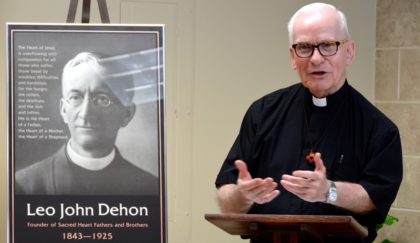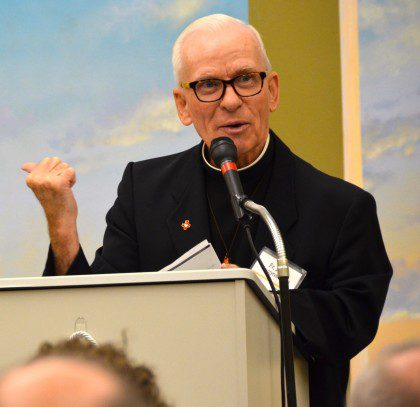Today, March 25, is the feast of the Annunciation, a commemoration of the Angel Gabriel’s visit to the Virgin Mary to announce that God had chosen her to be the mother of his son. In his homily today, Fr. John Czyzynski, SCJ, spoke of the significance of Mary’s “YES” as a model for Dehonians. “Nourished by the Eucharist that we receive, by God’s word that is proclaimed and by the love and faith that we share in community, may we be strengthened to renew our commitment to live a life of oblation in the spirit of love and reparation: behold WE come to do YOUR will. Let it be done to us according to your word,” he writes.
Read Fr. John’s full homily below:
“I suggested that the feast of the Annunciation should be one of our patronal feasts. Big time.”
 Some time ago our general administration sent out a list of patronal feasts for our congregation and they asked for feedback. I know that I was one of those who suggested that the feast of the Annunciation should be one of our patronal feasts. Big time. Fr. Leo John Dehon said that it was significant that he was baptized on March 24th, the vigil of the feast of the Annunciation. Our Constitutions No. 6 quotes a statement that Fr. Dehon included in the Spiritual Directory which he wrote. He says: “our whole vocation, our purpose, our duty, our promises are found in these words: Ecce Venio… Ecce Ancilla…” (Spiritual Directory I. 3) Both of those scripture passages are central to this feast of the Annunciation. Jesus’ Ecce Venio and Mary’s Ecce Ancilla come together on this day.
Some time ago our general administration sent out a list of patronal feasts for our congregation and they asked for feedback. I know that I was one of those who suggested that the feast of the Annunciation should be one of our patronal feasts. Big time. Fr. Leo John Dehon said that it was significant that he was baptized on March 24th, the vigil of the feast of the Annunciation. Our Constitutions No. 6 quotes a statement that Fr. Dehon included in the Spiritual Directory which he wrote. He says: “our whole vocation, our purpose, our duty, our promises are found in these words: Ecce Venio… Ecce Ancilla…” (Spiritual Directory I. 3) Both of those scripture passages are central to this feast of the Annunciation. Jesus’ Ecce Venio and Mary’s Ecce Ancilla come together on this day.
When Mary is invited by Gabriel to be the Mother of God, she places herself at God’s disposition and says: “let it be done to me according to your word.” Jesus never said the words: “behold I come to do your will,” but when the author of the letter to the Hebrews was searching for a way to capture Jesus’ disposition, His attitude, on coming into this world as the incarnate Son of God, he places those words on His lips. The words are actually taken from Psalm 40.
“It is difficult to accept not being in control”
Fr. Dehon takes both of those phrases and says that is what he wants for his life and the lives of all of his sons, the Priests of the Sacred Heart, to be about. They express for him a commitment to live a life of oblation. I know that I have said before that I see these two sentences as expressing the masculine and feminine aspects of living a life of oblation. When, with Jesus, we say: “behold I come to do your will,” we express our desire to be totally obedient to whatever God asks of us, to take the active role, to be the agents of fulfilling God’s will for us. That I see as the masculine aspect of oblation. When, with Mary, we say “let it be done to me according to your word,” we are no longer the active agents. We let go and give control to our God. We express our total openness to receive, to accept whatever our loving God asks of us. That is what I see as the feminine aspect of oblation. I feel that it is more difficult to express and live this feminine aspect of oblation. It is difficult to accept not being in control.
 To live with those dispositions is what is called for in our life as oblates, as Priests of the Sacred Heart. The only way that we are able to live with those dispositions is to be convinced of God’s great love for us, as Fr. Dehon was. As he prayed over Paul’s words to the Galatians: “I live by faith in the Son of God who has loved me and given Himself for me,” Fr. Dehon was convinced that being loved so much demanded a response of total love in return. The way he felt he could do that was by living Ecce Venio and Ecce Ancilla.
To live with those dispositions is what is called for in our life as oblates, as Priests of the Sacred Heart. The only way that we are able to live with those dispositions is to be convinced of God’s great love for us, as Fr. Dehon was. As he prayed over Paul’s words to the Galatians: “I live by faith in the Son of God who has loved me and given Himself for me,” Fr. Dehon was convinced that being loved so much demanded a response of total love in return. The way he felt he could do that was by living Ecce Venio and Ecce Ancilla.
As we celebrate this feast of the Annunciation we ask through the intercession of Jesus and Mary that we might be convinced, like Fr. Dehon, of God’s tremendous love for us, that love which became incarnate in Jesus and is symbolized by His pierced Heart. It is belief in that great love of God for us that empowers us to move through our fear, to rise above it, convinced that God would never hurt us, and enables us to abandon ourselves to God to do and to accept whatever God asks of us as individuals and as members of this congregation.
Nourished by the Eucharist that we receive, by God’s word that is proclaimed and by the love and faith that we share in community, may we be strengthened to renew our commitment to live a life of oblation in the spirit of love and reparation: behold we come to do your will. Let it be done to us according to your word.

